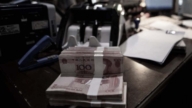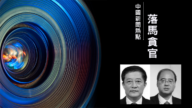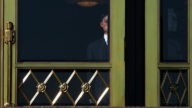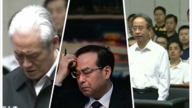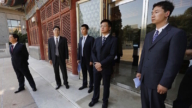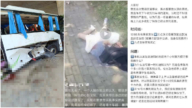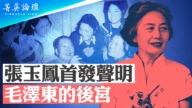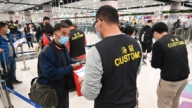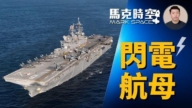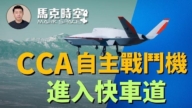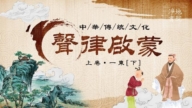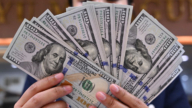【新唐人2013年01月02日訊】一系列中共高官被國外媒體爆出親屬獲取商業暴利後,日前,《紐約時報》又曝光前任「中國人民銀行」行長戴相龍家人錢權交易內幕。戴相龍親屬所投資的公司,以極低的價格大量購入「中國平安保險」股份,獲取暴利。專家指出,目前曝光出來的中共官員貪腐案件只是冰山一角,日後還會有更多高官的巨額財富呈現出來。
《紐約時報》在一篇題為「平安保險崛起,金融管控高官家族大獲其利」的報導中指出,戴相龍的女婿車豐及親屬掌控的「鼎和創業投資公司」,於2002年以5500萬美元購入「中國平安保險」股票,到2007年股價已達到31億美元。「鼎和創業」買下「平安保險」後,使不應該擁有金融權的「平安保險」免於拆分,繼續保有信託部門,2004年「平安保險」還得以在香港公開對外售股,目前,公司資產高達650億美元。
「中國平安保險」是目前中國保險業的龍頭企業,根據公司官方網站顯示,其中壽險和保險產業位居中國第二。
經濟時政評論專家草庵指出,戴相龍當時作為中共金融業的最高主管,在「平安保險」面臨分拆時,具有生殺大權,而「鼎和創業」買下「平安保險」的股份,也正是在戴相龍的管轄範圍之內。
經濟時政評論家草庵居士:「這個事情都可以明顯的看出,中共內部的錢權交易是跌破了底線,今天你揭露了戴相龍,事實上我們在未來的不久可以看到更多的官員捲入到這些案子,實際上中國有很多上巿公司、很多證券公司,都會涉及到這些人,他們這些內部的錢權交易只是冰山中的一角。」
《紐約時報》報導指稱,鼎和創業公司的結構複雜,車豐和他的友人是可以透過組織架構有效掌管「鼎和」。有記錄顯示,車豐甚至於2006至2009年擔任「平安保險」監理會成員。
《紐約時報》的調查發現,除購入平安保險股份外,鼎和創業公司於同年還購入「海通證券」大量股份,2007年「鼎和」持股金額高達10億美元。而戴相龍的妻子柯永真則在2007年至2010年間,擔任「海通公司」監理會會長。
草庵說,中國官員貪污的手段五花八門,很多通過親屬進行,官員則藏在後面操縱。草庵還表示,像戴相龍的事情,很多人都知道,只是人們不敢也不能去揭開,否則面臨被打壓甚至有牢獄之災。
經濟時政評論家草庵居士:「在中國黨政不分,錢權交易嚴重,它沒有一個獨立的司法制度去監督,另外它沒有一個公正、公平、獨立的新聞機構,在海外這種事情,它往往有一個獨立的司法機構,一個獨立的新聞監督機構,當你發生這個事情它就很快曝光出來。」
《紐約時報》這篇由駐上海記者張大衛(David Barboza)撰寫的報導,再次把矛頭指向中共總理溫家寶。報導說,「中國平安保險公司」主席馬明哲,直接向當時的國務院副總理溫家寶,和「中國人民銀行」行長戴相龍發出呼籲,要求政府放寬對平安保險公司實施大型金融公司分割的規定。
《紐約時報》其他系列報導說,在「鼎和」買下「平安保險」股份的同一天,天津「泰鴻公司」也以極低價格買下「平保」大量股份,而溫家寶的母親楊志雲於2007年持有總值1.2億美元的「平保」股票,這些股票就是登記在「泰鴻公司」的名下。
中共外交部發言人曾指責《紐約時報》關於溫家寶家人資產的報導是抹黑。星期一,《紐約時報》駐北京記者儲百亮,由於簽證沒有獲得延期而不得不離開中國。
《彭博通訊社》半年前(2012年6月)曾報導習近平旁系親屬打造的商業王國。幾天前,又詳細報導了中共八大元老的子女和孫輩如何控制中國的財富。
《彭博通訊社》的網站目前被中共屏蔽。
採訪編輯/劉惠 後製/陳建銘
US Media Unveiled More Power-for-Money Deal in China
A series of news reports have unveiled how relatives
of senior Chinese Communist Party (CCP) officials have reaped vast fortunes.
Recently, the New York Times disclosed power-for-money
deals among the family members of Dai Xianglong,
former president of the People’s Bank of China.
A company controlled by Dai’s relatives paid very low
prices to acquire large stakes in China Ping An Insurance.
This reaped huge profits.
Critics indicate that exposing this CCP officials
corruption scandal is just the tip of the iceberg.
In addition, huge weath amassed by other senior
CCP officials is expected to surface in the near future.
The New York Times’ article reported in 2002 on Dinghe
Venture Capital, a company controlled by Che Feng,
son-in-law of senior CCP official Dai Xianglong.
Che Fang, along with other relatives bought a large
stake in Ping An Insurance for US$55 Million.
By 2007, these shares were worth US$3.1 Billion.
The investment by Dinghe helped Ping An Insurance
avoid breaking up, and thus retain its trust division.
In 2004, Ping An Insurance was listed in Hong Kong,
which, today, is worth around US$65 Billion.
Ping An Insurance is China’s leading insurance company.
Both its life insurance and property and casualty
insurances businesses are ranked second in China.
This is in terms of its premium income.
Economics critic Cao An says that at the time,
Dai Xianglong was top CCP financial chief.
Ping An was facing a situation that would require a breakup.
Dinghe’s investment in Ping An is within Dai’s jurisdiction.
Cao An: “This case shows that CCP’s power-for-money
deals have sunk to below the bottom moral line.
Today it has exposed Dai Xianglong to public.
In the near future, we’ll see more
officials implicated in similar cases.
In fact, lots of security firms and listed companies
in China are all involved with these officials.
But these power-for-money deals
are still just the tip of the iceberg.”
The NY Times’ article says that Che Feng
and his business partners “set up a complex
web of companies” to control Dinghe.
The records show that Che Feng was “nominated to serve
on the Ping An board of supervisors from 2006 to 2009”.
The NY Times found that in 2002, Dinghe also
acquired a large stake in Haitong Securities,
which were worth about US$1 Billion by 2007.
“Later, between 2007 and 2010, Dai’s wife, Ke Yongzhen,
was chairwoman on Haitong’s board of supervisors.”
Cao An remarks that CCP officials have
used all sorts of means in their corruption.
Usually, officials hide backstage manipulating
their relatives who appear in public.
Cao An adds that many people know similar cases
to that of Dai’s, which they dare not and cannot disclose.
Otherwise, they will risk suppression and even jail terms.
Cao An: “In China, there’s no separation between the Party
and government, but has serious power for money deals.
There’s no independent judiciary to supervise the CCP.
Neither has it a just and independent media watchdog.
Overseas, a democratic country has an
independent judiciary, and a media watchdog.
So usually, such a thing can be disclosed when it happens.”
The NY Times’ article, authored by David Barboza,
once again directed criticism at CCP premier Wen Jiabao.
It says that Ma Mingzhe, chairman of Ping An, “pleaded
with Mr. Dai to approve an overseas stock offering in 1998.”
It says, “It would be rather difficult to raise such
a huge amount of money in the domestic market.”
The New York Times reported that like Dinghe,
the Tianji-based company Taihong also has
a large stake in Ping An for extremely good prices.
Reportedly, Wen Jiabao’s mother Yang Zhiyun
held Ping An shares worth US$ 0.12 billion in 2007.
These were registered in Taihong’s name.
In the past, CCP Foreign Ministry spokesman criticized the
New York Times coverage on Wen Jiabao’s family assets.
On December 31, Chris Buckley, the New York
Times reporter in Beijing had to leave China.
This is for having failed to get a visa extension.
In June 2012, the Bloomberg reported on business
empires built by Xi Jinping’s collateral relatives.
Days ago, the news agency reported in detail on how
offspring of eight CCP veterans control China’s wealth.
The Bloomberg site has been blocked
from being browsed in China.




